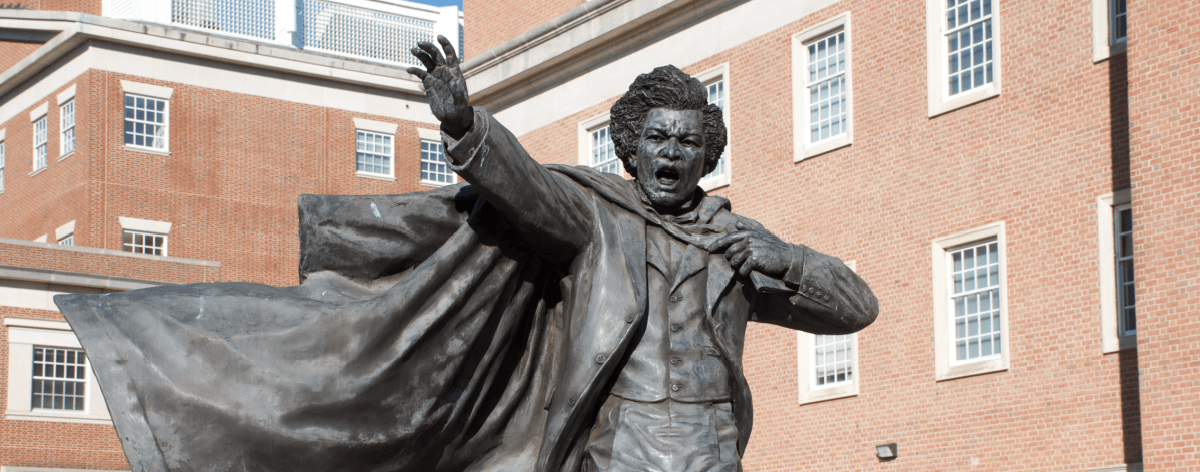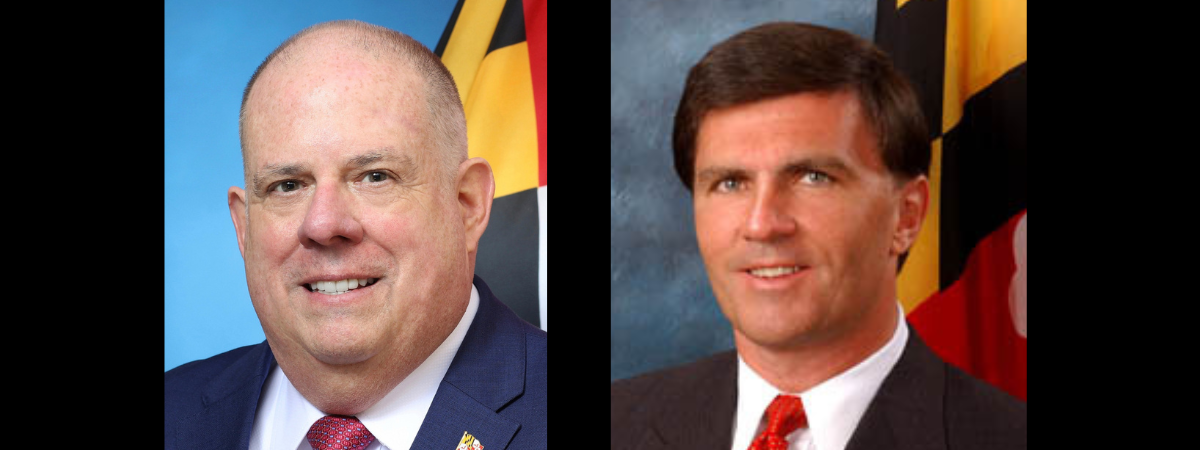Frederick Douglass Founded Newspapers to Allow Black Writers to Tell Their Own Stories

Frederick Douglass statue located on the campus of the University of Maryland College Park.
Photo: Adonijah Bourne/Howard Center for Investigative Journalism
He boarded the northbound train in Baltimore dressed as a sailor. He carried questionable identification documents, and some travel money given him by the woman he soon would marry.
He transferred to a steamboat in Delaware, disembarked in Philadelphia, then made his way to a safe house in New York City. There the journey ended, and on that September day in 1838, Frederick Douglass was free at last.
Not quite a decade later, in 1847, Douglass had settled in Rochester, NY, a last stop on the Underground Railroad route to Canada. Having raised enough money on an anti-slavery speaking tour in Europe, he launched his first newspaper, The North Star, from the basement of the Memorial AME Zion Church, where he worshipped.
“To millions, now in our boasted land of liberty, it is the STAR OF HOPE,” he proclaimed in the premier issue.
Twenty years earlier, Samuel Cornish and John B. Russwurm had founded Freedom’s Journal, the nation’s first Black-owned newspaper. Douglass echoed their insistence that Black voices be heard on issues especially important to Black people, most of whom were enslaved in the South.
“It is neither a reflection on the fidelity, nor a disparagement of the ability of our friends and fellow-laborers, what ‘common sense and only folly denies,’ that the man who has suffered the wrong is the man to demand redress, that the man STRUCK is the man to CRY OUT, and that he who has endured the cruel pangs of SLAVERY is the man to advocate Liberty. It is evident we must be our own representatives, not exclusively but peculiarly — and distinct from but in connection with our white friends,” he wrote.
Implicit in Freedom’s Journal and The North Star’s emphasis on the role of Black journalists was the importance of the space in which the news is written, and the synergy involved in creating “a medium for Black writers to tell their own stories,” said Christoph Mergerson, professor of race and media at the University of Maryland.
“When you’re amongst people who know you, you can talk in a certain shorthand. You can say things, you can speak in a certain way where you’re going to be understood, where you might not [in] other audiences. You can say things sometimes more bluntly,” Mergerson said in an interview.
“When you read what these men and women wrote back then, there was a desire to be heard and to be heard clearly, and not worry too much about the respectability, politically, of what they were saying,” he said. “These were people who meant to have their freedom and they were meant to tell whoever they wanted to about it.
“One is struck by the intensity of the appeal,” Mergerson said. “There’s a lack of sugar-coating reality that happened in other countries and other contexts.”
Freedom’s Journal survived for just two years; The North Star lasted four. In 1851, Douglass merged it with The Liberty Party Paper, also an abolitionist newspaper. The new publication was named, accordingly, Frederick Douglass’ Paper.
The Paper began as a weekly, but evolved to a monthly. And as the nation headed toward civil war, it focused on the recruitment and acceptance of Black troops, an issue that would re-emerge in the aftermath of World War I.
Douglass’s third newspaper was The New National Era, launched after he moved to the District of Columbia in 1870. Like The North Star, it lasted only four years, and its collapse ended his newspapering career.
“A misadventure though it was, which cost me from nine to ten thousand dollars, over it I have no tears to shed,” he wrote later in Life and Times of Frederick Douglass, his third autobiography.
“The journal was valuable while it lasted, and the experiment was full of instruction to me, which has to some extent been heeded for I have kept well out of newspaper undertakings since.”
In 1895, Ida B. Wells-Barnett published The Red Record: Tabulated Statistics and Alleged Causes of Lynching in the United States. Douglass wrote the book’s foreword as a letter to the investigative reporter, and a commentary on her work.
“If the American conscience were only half alive, if the American church and clergy were only half Christianized, if American moral sensibility were not hardened by persistent infliction of outrage and crime against colored people, a scream of horror, shame, and indignation would rise to Heaven wherever your pamphlet shall be read.
“But alas! Even crime has power to reproduce itself and create conditions favorable to its own existence. It sometimes seems we are deserted by earth and Heaven—yet we must still think, speak and work, and trust in the power of a merciful God for final deliverance.”
The Howard Center for Investigative Journalism is a multidisciplinary program of the University of Maryland Philip Merrill College of Journalism, focused on training the next generation of reporters through hands-on investigative journalism projects.
Common Sense for the Eastern Shore







